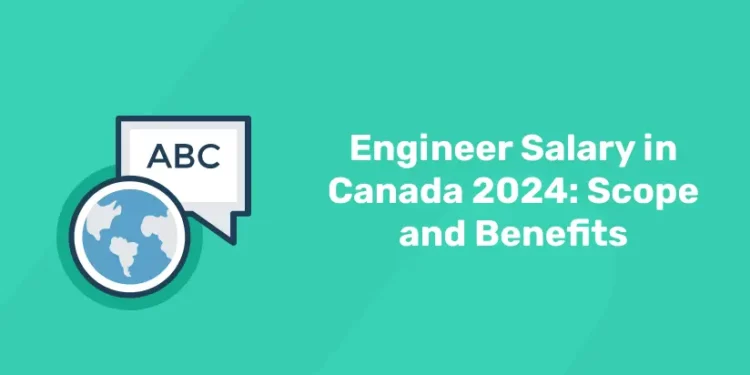Table of Contents
Canada is constantly looking for qualified personnel in a range of engineering specialties to help with its expanding infrastructure and infrastructure projects. Engineers in Canada are in greater demand , especially in the civil, mechanical, electrical, and chemical engineering domains, according to a research published by Engineers Canada. Companies that hire engineers are not surprised by this, but the epidemic hastened the departure of many baby boomers, who were supposed to stay in their jobs longer and mentor the new generation of engineers. In this article lets discuss about Engineer salary in Canada and their scope and benefits.
ACHIEVE YOUR DREAM IELTS SCORE!
What is the average Engineer salary in Canada?
An individual employed in Canada normally makes approximately USD 106,400 annually. The lowest average pay is USD 90,400, while the highest average salary is USD 122,300 (the real maximum compensation is higher). This represents the average pay with housing, transportation, and other amenities included. Pay disparities between professions are substantial. See the wages for certain job titles below if you’re interested in learning more about the pay for a particular position.
Engineer Pay Scale and Salaries in Canada
1: Most university students ........................ on campus in their first year.
Salary Structure
Few engineers in Canada make more than USD 265,200 per year. In Canada, 75% of engineers make USD 83,100 or less annually. In Canada, half of the workforce is employed as engineers and makes less than USD 58,200, with the remaining 25% earning less than USD 43,600.
Minimum Wage and Starting Salary
Understanding the legally required minimum pay as well as the starting remuneration offered to new hires in the engineering field is essential to ensuring fair labour practices and successful career beginnings. The Engineer-specific Minimum Wage and Starting Salary cover the base pay scales for entry-level roles in this industry and have a big influence on both employers and job seekers. The minimum pay for an engineer in Canada is USD 90,400.
Median Salary
Median Salary is the average of all salaries in a dataset, with half of the values above and half below it. It gives a more balanced picture of the distribution of income, making it less susceptible to extreme values. Average wages across a range of industries and occupations are frequently determined using this method. The median wage in Canada is $84,000 USD.
Salary range and Percentile
In Canada, the average pay range for an engineer is between USD 90,400 and USD 122,300. The percentile, on the other hand, is helpful for benchmarking pay levels because it represents a particular point in the range and illustrates how a wage stacks up against others in the dataset.
Ace Your IELTS Exam with Confidence!
Unlock your potential with our expert-led IELTS preparation course. Achieve your dream score and open doors to global opportunities!
Start Your IELTS Journey Today!Engineer Salary In Canada based on experience
Engineer salary in canada are well-known for earning a high salary, particularly when compared to other occupations. Due to the large range of specialisations available in the field of engineering, earnings might vary significantly based on the industry, years of experience, and type of employment.
Mechanical Engineer
Starting salary:
- $55k – $65K (Entry level candidate)
- $75 – 85k (5+ years experience)
- $100K – 150K+ (10 – 20+ years experience)
(Including reliability engineering and specific mechanical engineering roles – Static or Rotating Equipment Engineer, Integrity Engineer, Maintenance Engineer)
Electrical Engineer
Starting salary:
- $55k – $65K (Entry level candidate)
- $75 – 85k (5+ years experience)
- $100K – 150K+ (10 – 20+ years experience)
Chemical Engineer
Starting salary:
- $55k – $65K (Entry level candidate)
- $75 – 85k (5+ years experience)
- $100K – 150K+ (10 – 20+ years experience)
(Process Engineer, Process Safety, Production Engineering, Reservoir Engineering)
Petroleum Engineer
Starting salary:
- $60k – $65K (Entry level candidate)
- $85k – 100k (5+ years experience)
- $120K – 150K+ (10 – 20+ years experience)
(Including Reservoir Engineer, Production Engineer, Development/ Exploitation Engineer, Operations Engineer)
Currently, engineers employed in the oil and gas sector receive the highest total salary. Oil and gas businesses pay their employees well, and they often provide bonuses and extensive incentive programmes. Usually, they make up 20% to 50% of the base pay. These incentives are frequently optional and are usually based on the employee’s experience level and the success of the business.
Civil Engineer
Starting salary:
- $55k – $65K (Entry level candidate)
- $75 – 85k (5+ years experience)
- $100K – 150K+ (10 – 20+ years experience)
(Including Geotechnical Engineer, Water Treatment Engineer)
For those employed in the mining, oil and gas, chemical, manufacturing, and agricultural sectors, these base pay ranges apply to Chemical, Mechanical, Electrical, and Civil Engineering. Through both short- and long-term incentive programmes, total pay would probably climb from 5% to 50% of base salary.
The industry, the kind of business, individual and corporate performance, years of experience, position, responsibility, and location are some of the variables that affect these bonuses. The best paying jobs are typically found in British Columbia, Ontario, and Alberta.
CRACK IELTS EXAM WITH ONLINE COACHING – JOIN NOW
Eligibility Requirements to work as an engineers in Canada
Engineering is one of the Canadian government’s regulated professions, thus holding positions of responsibility can be challenging. Nonetheless, you may function as an engineer under the direction of a regulated engineer, contingent upon your position and environment. You can become a qualified engineer in your province in a number of ways.
The prerequisites for becoming a certified engineer and being authorised to practise as a certified engineer are set by the association of engineers in each province.
Licensed engineer
An engineer who fulfils all the requirements in the province in which they wish to operate is considered licenced. Each province has a provincial or territorial engineering association that oversees all facets of the engineering profession in Canada. To obtain a licence as an engineer, you need to:
- Register with the engineering association of your province or territory
- Be a permanent resident
- Complete Work experience and references assessment
- Meet the provincial requirements of the language competency assessment
- Pass a character assessment
- Complete a professional Practice Examination
Un-licensed engineer
Without a licence, you can still work as an engineer in Canada as long as you are under the supervision of a professional engineer (P.Eng.). It is important to consider that:
- Depending on the province in which you wish to practise, there are certain prerequisites.
- Your ability to grow professionally will typically be determined by your knowledge of English or French.
- A professional engineer with a licence to oversee you should be in place (P.Eng.)
Application Requirements
Engineers in Canada, must fulfil certain standards related to education, work history, ethics and law, language proficiency, and moral character.
Academic Requirements
To apply for registration as a professional engineer, you must have completed a four-year full-time bachelor’s degree programme in applied science, engineering, geoscience, science, or technology. You might be given academic exams and/or interviews if you don’t have an engineering undergraduate degree from a recognised university programme.
This often indicates that you are an engineering bachelor’s degree holder from an approved university. In the event that you do not hold an undergraduate engineering degree from a recognised university, the engineering discipline for which you are applying will compare your academic background to the course syllabus. Academic assessments could be assigned to you if necessary components are missing.
Please be aware that some of your experience before finishing the assigned topics may not be credited towards the required 4 years of satisfactory experience, unless all assessed deficiencies have been cleared, either by passing approved equivalent courses or by successfully completing the examinations.
Experience Requirements
In order to obtain a professional engineer registration, it is necessary to provide proof of at least four years of excellent engineering job experience. In order to fulfil the prerequisite of having experience in a Canadian environment, candidates must meet the requirements for the Canadian Environment Competencies and exhibit familiarity with Canadian laws, codes, and standards as well as quality assurance, safety consciousness, professional responsibility, and communication. Should you acquire experience in an area unrelated to your degree programme, you may be required to take an exam, participate in an interview, or undergo an academic review.
A candidate’s job experience in engineering must encompass the application of theory and give them exposure to or experience in the following general areas: management, communication, practical experience, and the social aspects of engineering.
English Language Competence for Practice
The assessment of English language proficiency for practice is done using:
- Using the Competency Assessment System, communication competencies
- Comments by referees/validators,
- Remarks from interviewers (should one be necessary),
- An authorised English language test (IELTS, CAEL, or Duolingo English Test*), if necessary.
Entri App: Best Online course for IELTS
One of the greatest online learning resources for IELTS preparation is the Entri Learning App. With knowledgeable instructors, organised study materials, excellent video content, sessions for clearing up questions, individualised study schedules, and inspiring instructors, you will receive great marks in every subject here.
Course Overview
- 30 Days Mentorship
- Exam Packs – Reading Practice
- PDF Course materials
- 6 Months Recorded Videos Validity
- Live Exams and Special Exams
- Recorded Video Classes on App
- IELTS with Mentorship: Get Mentorship & Recorded Videos
IELTS with Mentorship Course Features
- Daily practice and correction sessions through WhatsApp.
Duration: 2 hours. Any 2 modules, a day.
(There are 4 modules in total) ONE-TO-ONE LIVE - Live Class: Weekly twice. Individual attention,
Doubt clearance and Speaking mock tests Identify your weak
areas and focus more on those. Duration: 1 hour. - MATERIALS DISCUSSED IN CLASS: 20 Writing question papers.
20 Reading materials and 20 Listening materials.
Individual Speaking sessions.
CRACK IELTS EXAM WITH ONLINE COACHING – JOIN NOW
In-demand technical skills for engineering in Canada
Technical skills are sometimes referred to as hard and job-specific skills. These are the kinds of abilities that you’ll normally pick up via school, a job, or training. The following are a few hard talents that are in demand for positions in engineering:
Project management
It is your responsibility as an engineer to make sure that the project’s objectives are met on schedule and within budget. A crucial ability is project management, which usually entails producing thorough project documentation with distinct deadlines, restrictions, and roles assigned. You will also need to encourage teamwork and assess the effectiveness of your group.
Budgeting
Effective budgeting is crucial for controlling project expenses, particularly in resource-intensive fields like mechanical and civil engineering. Engineers and engineering managers are frequently relied upon by operations and management teams to offer precise budget estimates, which are essential for project planning, costing, and profitability.
Quality assurance
One of an engineer’s most important talents is quality assurance. Engineers are in charge of making sure that projects and products are high-quality and long-lasting in many different fields. This entails following set quality standards, guarding against flaws and mistakes during the production process, and proactively concentrating on project improvement to reduce flaws and errors.
Troubleshooting
There will be times when your machine or product does not function as intended. It will be your responsibility as an engineer to identify and address the underlying issue. A methodical strategy is needed for troubleshooting in order to locate the problem, comprehend its cause, and address or resolve it to prevent recurrence.
CRACK IELTS EXAM WITH ONLINE COACHING – JOIN NOW
| Related Links | |
| All About IELTS Exam | IELTS Reading Practice Test |
| IELTS Listening Practice Test | IELTS Writing Practice Test |
| IELTS Speaking Practice Test | Vocabulary in IELTS |









